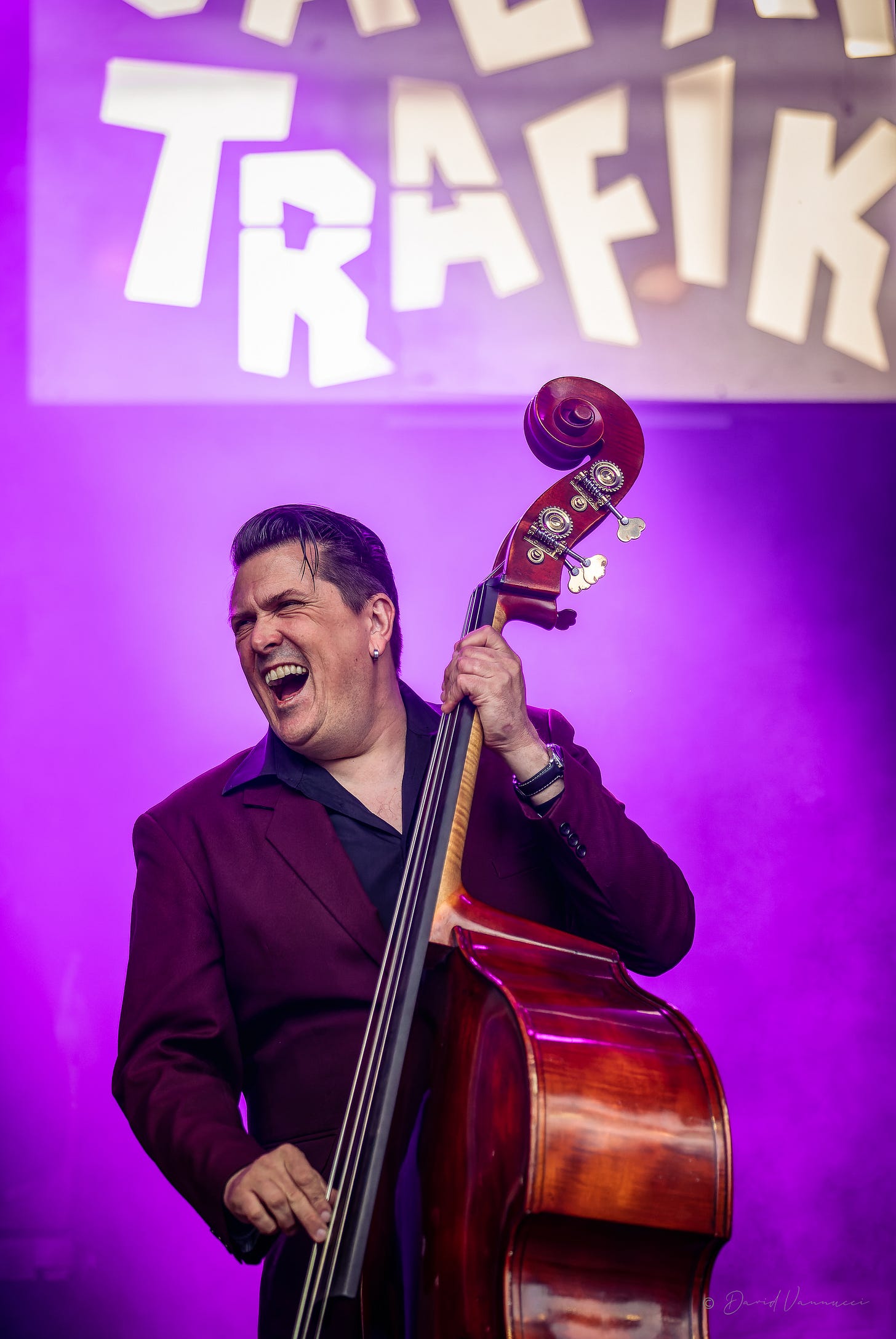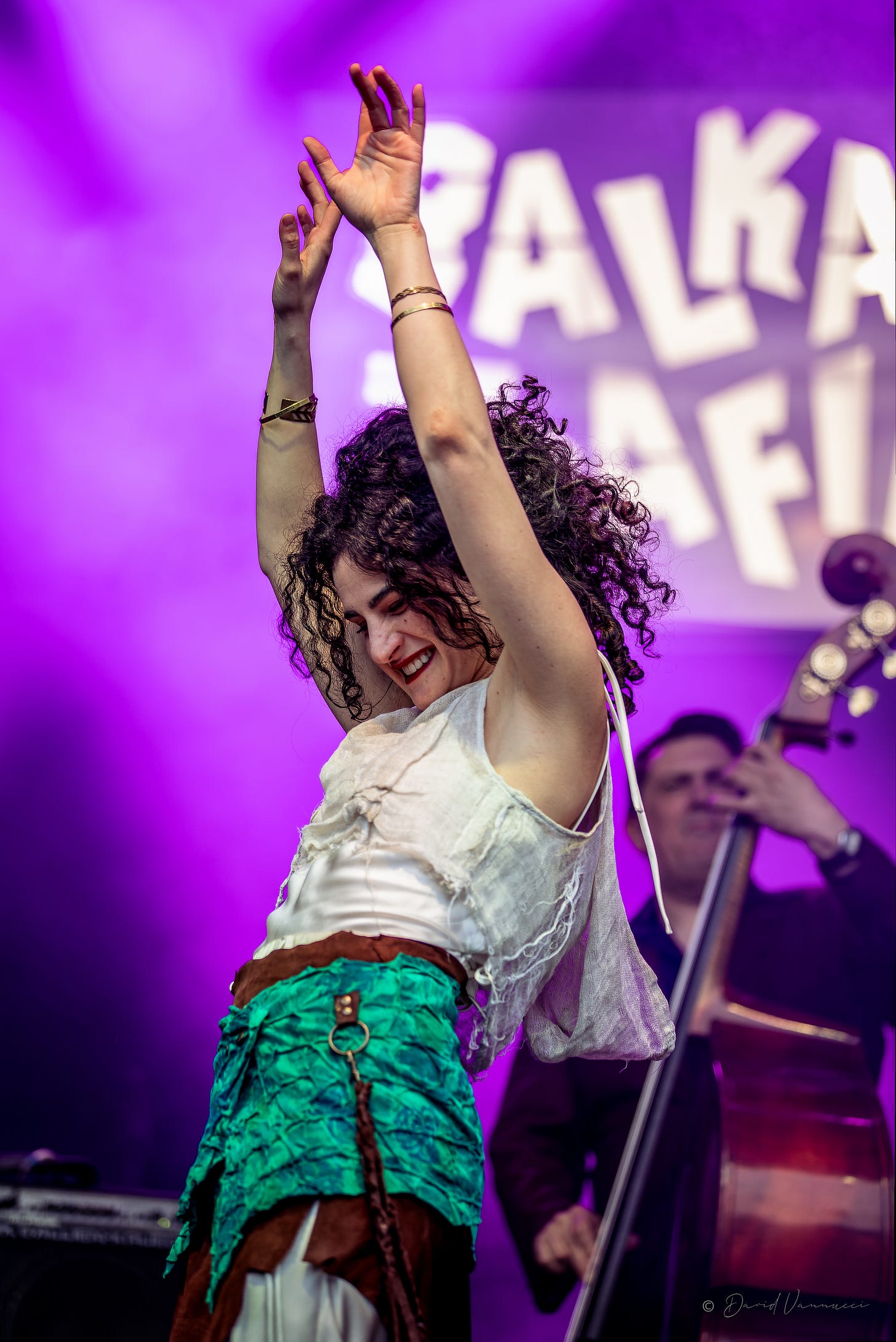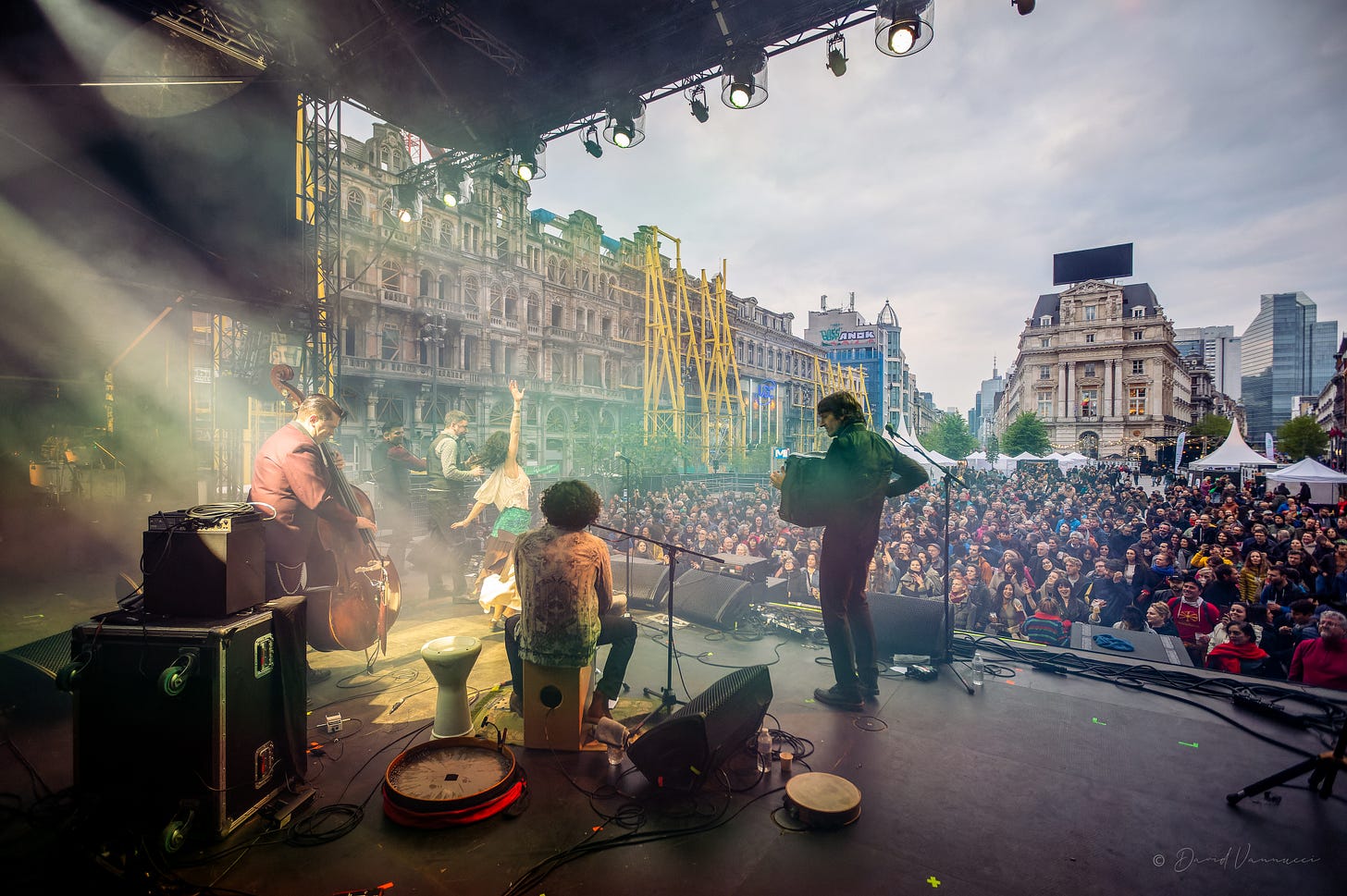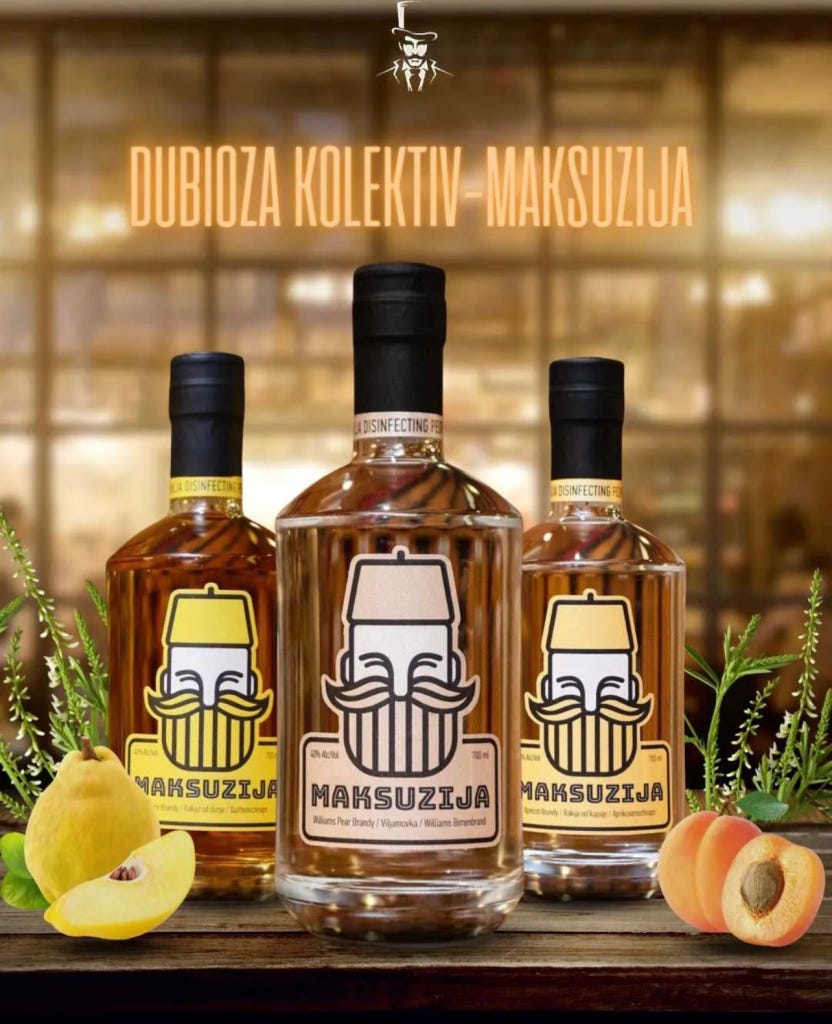S4E19. Living the Balkans '7' notes at a time
Interview with Ivan Kovačević, double bassist of Barcelona Gipsy Balkan Orchestra, at the backstage of the Balkan Trafik Festival in Brussels. A new musical breakthrough album for a kaleidoscopic band
Dear reader,
welcome back to BarBalkans, the newsletter with blurred boundaries.
It is like a tingling that starts from the foot, up and down, up and down. Then it goes up the spine, like a shiver of pleasure, and spreads throughout the body, setting every limb, every muscle in motion. Standing still becomes impossible. You clap your hands, shake your shoulders, dance to the rhythm of the music, without even knowing where this confidence comes from. The audience is frantic, euphoric, as if energized by an ancestral spirit channeled through six unstoppable instruments and an extremely deep and seductive voice.
To describe in words the physical and emotional sensations of a concert has always been one of the most elusive challenges for the human mind. And when it comes to folk - Balkan, Gypsy - music, this goal is even more unattainable.
The risk of narrative failure is high. However, this can be the perfect excuse to narrate a disruptive musical and cultural project. Which, from the Balkans via Barcelona, reaches Brussels and many European cities.
The soul of the kaleidoscopic Barcelona Gipsy Balkan Orchestra finds expression in the words of its double bassist, Ivan Kovačević, interviewed by BarBalkans at the backstage of the Balkan Trafik Festival in Brussels, just before the concert on April 26.
With an exclusive preview of the result of two years of experimental work by the band, which for years has been fusing Balkan-Mediterranean sounds with elements of blues, tango and even reggae. Before returning to rekindle dancing spirits with an all-Balkan - and all-European - folk soul.
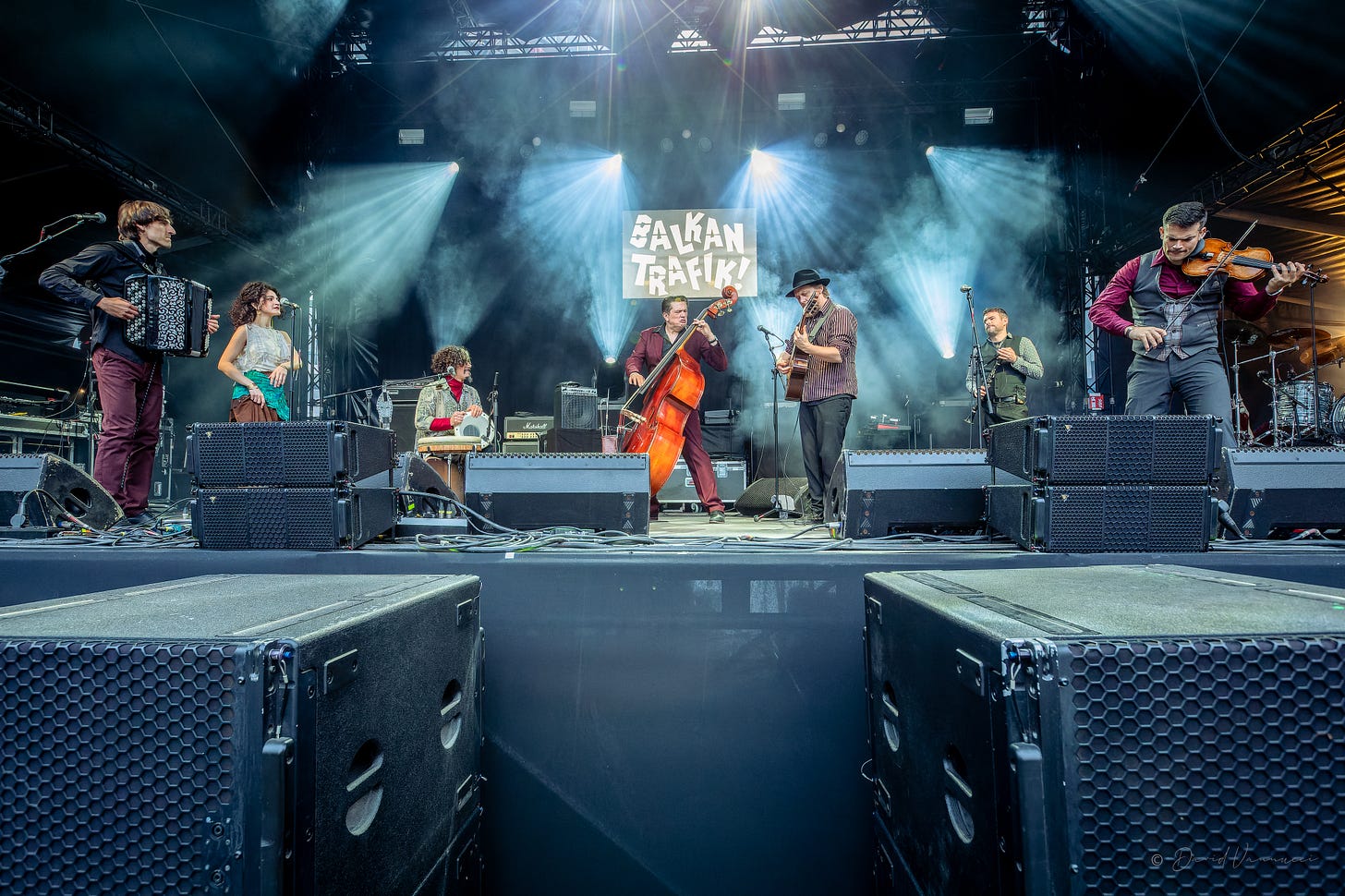
From Barcelona with passion
Originally formed in 2012 as Barcelona Gipsy Klezmer Orchestra, this band is the result of musical encounters spanning from Eastern Europe to Spain, and even the Middle East. And, of course, the Balkans.
After the departure of its co-founder, Serbian clarinetist Robindro Nikolić, in 2015, Barcelona Gipsy Balkan Orchestra evolved into its current form (still maintaining BGKO as acronym).
«Twelve years and seven albums, a lot of time has passed, while almost all the artists and many other things have changed» since the Barcelona Gipsy Balkan Orchestra’s journey began in 2012, Kovačević tells BarBalkans under the stage of the Balkan Trafik Festival.
«But the most important thing remained, the urge to share the musical journey with the world, the way we conceive music and life, the way we see Balkan music». With a particularly appropriate metaphor, the Serbian double bassist explains that «we are like a writer who is constantly refining by reading and writing, but we do it through music».
This characteristic of «changing and learning every day, evolving our opinions and our words» also stems from one of the greatest peculiarities of the Barcelona Gipsy Balkan Orchestra: the geographical origin of its members.
Spain, France, Serbia, Italy (with the energy and vocal depth of singer Margherita Abita) are the countries where the current permanent artists of this band come from. «I am the only one from the Balkans right now, but it is very important that we come from all over Europe», Kovačević states with no doubts.
Read also: Special edition - Dubioza kolektiv
Diversity is the backbone of the band, and not just geographically. «No one played Balkan music before joining this group, we all come from different musical genres and cultures». Some from tango, some from jazz, blues, and rock and roll «like me», and others from reggae «or even house music».
Each of these artists «brought a specific and special language», to the point that «we mixed together in this Balkan musical culture, working together all these years and creating something new».
Also thanks to the fact that everyone has «the artistic need» to maintain other projects parallel to the Barcelona Gipsy Balkan Orchestra, «this engagement outside the band allows all of us to bring something that the others do not know and to grow together also in this way».
After all, «we are musicians 24 hours a day, this is our job but also our life», as Kovačević recalls looking the stage behind him.
Like life itself
Balkan music «for me is a sort of way of living», Kovačević confirms, expressing the adrenaline of the debut at the Balkan Trafik Festival.
To understand the importance of this Festival to spread their music, the double bassist of the Barcelona Gipsy Balkan Orchestra underlines that «we have already played in some festivals, but we are not so used to it yet». But most importantly, «we know that many people join this Festival, we are happy and excited, because for us the most important thing is to make connection with the audience».
Experiencing Balkan music also means relating to the Balkans and understanding their representation in the collective imagination, both inside and outside the region. «I grew up there, I listened to that music that went through a difficult period in the Nineties, and it was very difficult to relate».
Read also: S2E15. A hail of music notes
When the Serbian musician moved to Barcelona 23 years ago, «I realized its potential and the fact that it has a lot to offer, because it carries so much history and the people who produce this music put their whole heart into it».
In other words, «Balkan music represents the people of each of these countries for who they really are», Kovačević sums up the meaning of the Barcelona Gipsy Balkan Orchestra’s work around Europe.
Countries like Italy and France - «unlike Spain» - have many connections, «because they had a sort of Balkan revolution» between the Nineties and the early 2000s.
«I think because this music goes straight to your heart: you can dance, cry, laugh, sing, whatever you want». For Kovačević, Balkan music «is like life itself, this is the most beautiful part».
However, «the particular rhythms and the mixture with Turkish and Russian influences are more difficult to fully understand» for people who come and live in Western Europe. This is why this music «on the one hand is very easy to understand, but on the other hand it can be more difficult to get used to».
Seven
For all of us - people who are used to listening to this music and people who are not - Barcelona Gipsy Balkan Orchestra has some very fresh news.
A few days after the concert at the Balkan Trafik Festival, and on the eve of the publication of this newsletter, the new album “7” was released on May 3.
Siete, Sette, Set, Sept, Седам, Zazpi, Επτά, Сім.
«Seven is a very important number for different cultures around the world», Kovačević explains to BarBalkans what lies behind this choice. «This is a particular and somehow also strange number», with secular and spiritual symbolism, «which we found in many places where we did not expect».
“7” is the Barcelona Gipsy Balkan Orchestra’s seventh studio album, representing at the same time a first for the band: «Most of the album is composed by our own original songs», the double bassist continues, pointing out that «we have always composed music, but this is the first time we are writing our own lyrics».
Moreover, this number symbolizes the union of the stories - origins, cultures, ways of living and thinking - of the seven members of the band.
«Several songs have been released as singles over the past few years, this album marks the conclusion of a journey that started two years ago all together», Kovačević concludes our chat with a smile.
One path for seven destinies. Seven paths leading to the same destination.
The Barcelona Gypsy Balkan Orchestra. The Balkan music throughout Europe.
Pit stop. Sittin’ at the BarBalkans
We have reached the end of this piece of the road.
At our bar, the BarBalkans, we cannot miss something absolutely in-line with the spirit of Barcelona Gipsy Balkan Orchestra.
«Rakija of course!», Kovačević has no doubts. «I recommend dunjevača», the quince rakija - «membrillo in Spanish» - which is «very popular in Serbia and in all the Balkans».
If you have a good memory, you may remember the recommendation on the occasion of the Balkan Trafik Festival last year: Maksuzija, the rakija produced by our friends Dubioza kolektiv.
«This word describes a special gift, for example when you have an important guest, you say: “This is maksuzija, this is something special for you!”», the bass player Vedran Mujagić, told BarBalkans in an exclusive interview. And one of their «special gifts» is dunjevača, indeed.
Recommended by Barcelona Gipsy Balkan Orchestra, produced by Dubioza kolektiv. Enjoyed together at the Balkan Trafik Festival in Brussels.
Read also: S4E13. Gastronationalism tastes like nothing
Let’s continue BarBalkans journey. We will meet again in two weeks, for the 20th stop of this season.
A big hug and have a good journey!
If you have a proposal for a Balkan-themed article, interview or report, please send it to redazione@barbalcani.eu. External original contributions will be published in the Open Bar section.
The support of readers who every day gives strength to this project - reading and sharing our articles - is also essential to keep BarBalkans newsletter free for everyone.
Behind every original product comes an investment of time, energy and dedication. With your support BarBalkans will be able to elaborate new ideas, interviews and collaborations.
Every second Wednesday of the month you will receive a monthly article-podcast on the Yugoslav Wars, to find out what was happening in the Balkans - right in that month - 30 years ago.
You can listen to the preview of The Yugoslav Wars every month on Spreaker and Spotify.
If you no longer want to receive all BarBalkans newsletters (the biweekly one in English and Italian, Open Bar external contributions, the monthly podcast The Yugoslav Wars for subscribers), you can manage your preferences through Account settings.
There is no need to unsubscribe from all the newsletters, if you think you are receiving too many emails from BarBalkans. Just select the products you prefer!




